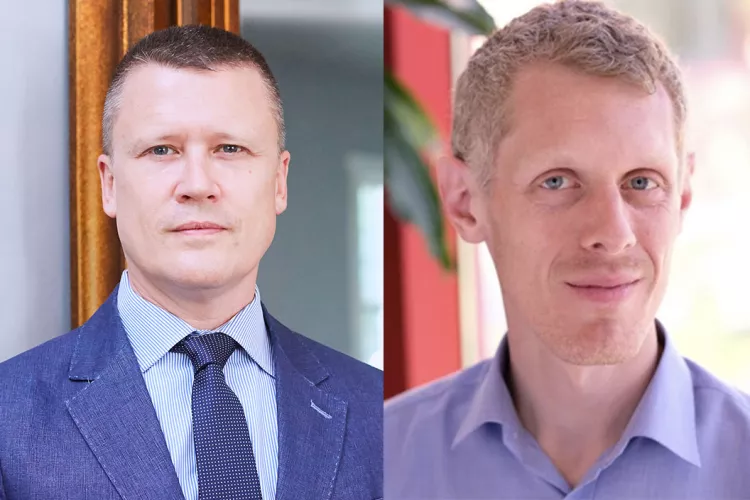Linguists K. David Harrison and Robbie Hart ’04 Named to Explorers Club 50

K. David Harrison (left) and Robbie Hart ’04 are both included on the inaugural list of the Explorers Club 50: Fifty People Changing the World the World Needs to Know About.
As a linguistics professor at Swarthmore since 2001, environmental linguist and National Geographic Explorer K. David Harrison has encouraged his students to get out, get their boots dirty, and explore. “He was the person who said, if you want to do important research, you’ve got to get out, do a study abroad that gives you time to do independent research, and immerse yourself in field work,” says Robbie Hart ’04, an ethnobotanist and director of the William L. Brown Center at the Missouri Botanical Garden.
Now colleagues, Harrison and Hart are both included on the inaugural list of the Explorers Club 50: Fifty People Changing the World the World Needs to Know About (EC50). Nominated by members of the Explorers Club, the EC50 recognizes leading explorers, scientists, and activists doing significant work to benefit local communities while contributing to a better understanding of the world.
Harrison, who recently gave a SwatTalk on environmental linguistics, was nominated for his work documenting endangered languages around the world through projects including the Talking Dictionary, an online repository of endangered languages, communal knowledge, photos, and more than 100,000 audio recordings of native speakers, and the Language Hotspots map, visualizing regions with the largest diversity of little-studied, endangered languages. These projects, both hosted at Swarthmore, were recently highlighted in a profile in The Advocate about Harrison and the history of LGBTQ+ explorers.
Hart was an enthusiastic student in Harrison’s linguistics classes. “Robbie came to Swarthmore as a transfer student from a community college in his home state, and immediately impressed me with his curiosity and work ethic,” says Harrison, who hired Hart as a research assistant after he graduated.
It was while helping with Harrison’s book When Languages Die that Hart discovered his passion for ethnobotany. “David made the case for why the traditional ecological knowledge stored in small languages matters, and what other things are lost when people stop speaking one of these Indigenous languages,” he says. “I found myself especially interested in the biological and environmental side of this.”
Hart’s current research, studying how high mountain plants respond to climate change, and how the people who use the plants are taking steps to mitigate it, began while he was earning a Ph.D. at the University of Missouri–St. Louis. The project, and Hart’s rare research combination of botany and linguistics, inspired Harrison to nominate Hart for the EC50.
Hart says the multidisciplinary approach to study he experienced at Swarthmore continues to influence his work. “Being able to work across biology and linguistics together was really important,” says Hart, who met another lifelong collaborator at Swarthmore in his wife, Elsa Trimble Hart ’06, a mystery author who has worked on research with Hart throughout their relationship.
“[Swarthmore] is not primarily a research university, but there was space such that David was able to have this program and include students in it,” says Hart.
Harrison attributes that to the College’s culture and size. “The College nourishes curiosity and respect for cultures, and is small enough that we can connect to people across all disciplines,” he says.
As researchers who value international collaboration and close links to local and Indigenous communities, Harrison and Hart are honored to be a part of a diverse group of explorers from six continents, including many Indigenous explorers, that accurately reflects the changing face of exploration.
“The future of exploration is greater inclusivity,” Harrison says, “and the elevation of minority cultures that will address some of the historical harms and inequalities that colonization created.”



